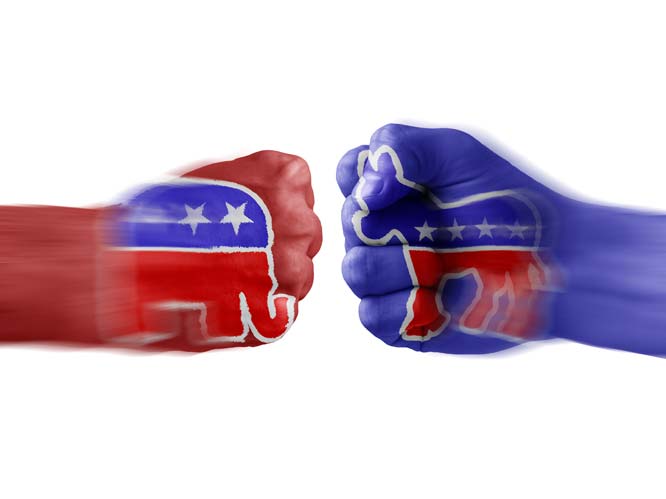
WASHINGTON — One year ago, on Nov. 8, American voters elected Donald Trump president. It was a victory that confounded national pollsters, stunned Democratic nominee Hillary Clinton and appeared to have surprised Trump himself.
When he walked onto the national stage in the wee hours of the following morning, Trump delivered remarks that reached out to friends and adversaries alike. "I say it is time for us to come together as one united people," Trump told supporters. "It's time."
Washington has not been the same since. If anything, the nation's capital is more divided than before the election. A recent Pew Research Center poll found that Republicans and Democrats are more divided than ever.
"What is striking is how little common ground there is among partisans today," wrote Carroll Doherty, director of political research at Pew.
Few Democrats have any interest in collaborating with Trump — but also, Republicans and Democrats have trouble working with members of their own party. The real dividing line could be between those who accepted the voters' verdict on Nov. 8, 2016, and those who never will.
Henry Olsen, author of "The Working Class Republican: Ronald Reagan and the Return of Blue-Collar Conservatism," sees a schism in both parties — with Republican never-Trumpers finding common cause with the progressive "resistance."
Both sides, Olsen noted, thought "the future was theirs." Traditional Republicans and hard-core Democrats alike cannot see past the fact that the uncouth Trump "beat them at their own game," Olsen said. He added, "They can't open their minds to the thought that people could vote for this person whom they loathe."
Esquire magazine ran a story about what key campaign operatives and journalists were thinking on election night 2016. New Yorker editor David Remnick was so sure Clinton would win that he had written an essay about "the first woman president."
Clinton campaign spokeswoman Zara Rahim disclosed, "We were waiting for the coronation. I was planning my Instagram caption." Rep. Adam Schiff, D-Calif., described his own victory as "the most somber and depressing victory party I'd ever had."
The election was a year ago, and already some Democrats are searching for ways to take it back. Democratic House members have filed legislation to impeach Trump.
Democratic mega-donor Tom Steyer has bankrolled a $10 million national TV ad campaign in which he urges voters to sign a petition to impeach Trump. That's an attempt to go back in time.
House Minority Leader Nancy Pelosi has signaled her displeasure with the effort. She recently told CNN's Jake Tapper that "whatever we do, we have a responsibility, first and foremost, to unify the nation. Second of all, you can't go down any path without the facts and the law."
Democratic strategist and CNN contributor Maria Cardona does not see a divided Democratic Party. "I don't think any Democrat who wanted Hillary to win or expected Hillary to win, including myself, has accepted the outcome," she said. "This man, Donald Trump, has done nothing but prove us right every single day, every single time he goes on Twitter."
Trump is convinced that the federal probe into possible Russian attempts to tilt the election is the fruit of Democrats trying to shift the blame on their unexpected 2016 election loss from themselves to sinister forces operating in the dark.
"They are engaged in 'the resistance' like we haven't seen in politics," Olsen said of the left.
In June, a left-wing activist shot at GOP congressmen as they practiced for a charity baseball game. The gunman wounded a police officer, congressional aide and lobbyist; Rep. Steve Scalise of Louisiana is facing a difficult recovery.
In the Republican Party, victory did not bring unity. "They're not merging two old companies into something new," Olsen said.
Trump has declared Twitter war on two GOP senators — Bob Corker of Tennessee and Jeff Flake of Arizona — who both announced they would not run for re-election in 2018.
Former White House chief strategist Steve Bannon has signaled that he will back challengers to every GOP senator running for re-election in 2018 — except for Sen. Ted Cruz of Texas.
In a special election to settle the U.S. Senate seat vacated by Attorney General Jeff Sessions, Bannon backed Roy Moore, who challenged the man appointed to the seat, Luther Strange. Trump endorsed Strange, but Moore won the primary. Bannon hailed Moore's primary win as a signal of a Republican "revolution."


 Contact The Editor
Contact The Editor
 Articles By This Author
Articles By This Author